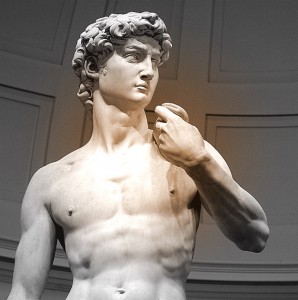William Shakespeare. Sonnet 19
Devouring Time, blunt thou the lion’s paws,
And make the earth devour her own sweet brood;
Pluck the keen teeth from the fierce tiger’s jaws,
And burn the long-lived phoenix in her blood;
Make glad and sorry seasons as thou fleet’st,
And do whate’er thou wilt, swift-footed Time,
To the wide world and all her fading sweets;
But I forbid thee one most heinous crime:
O! carve not with thy hours my love’s fair brow,
Nor draw no lines there with thine antique pen;
Him in thy course untainted do allow
For beauty’s pattern to succeeding men.
Yet, do thy worst old Time: despite thy wrong,
My love shall in my verse ever live young.
Patrick Stewart reading this sonnet
 The reference point for this translation is, of course, Michelangelo’s David – the image inevitably suggested by the very concept of “beauty’s pattern to succeeding men”, by the mention of carving, and, last but not least, by the powerful, truly timeless, rhythm of the third quatrain.
The reference point for this translation is, of course, Michelangelo’s David – the image inevitably suggested by the very concept of “beauty’s pattern to succeeding men”, by the mention of carving, and, last but not least, by the powerful, truly timeless, rhythm of the third quatrain.
In the painting, David is imbued with the warmth of life absent from the marble, but subjected to destructive red brushstrokes of devouring time. Both are contrasted to the blue movement emanating from his sling, the eternal symbol of seemingly impossible victory, this time, against the fierce Goliath of time.
